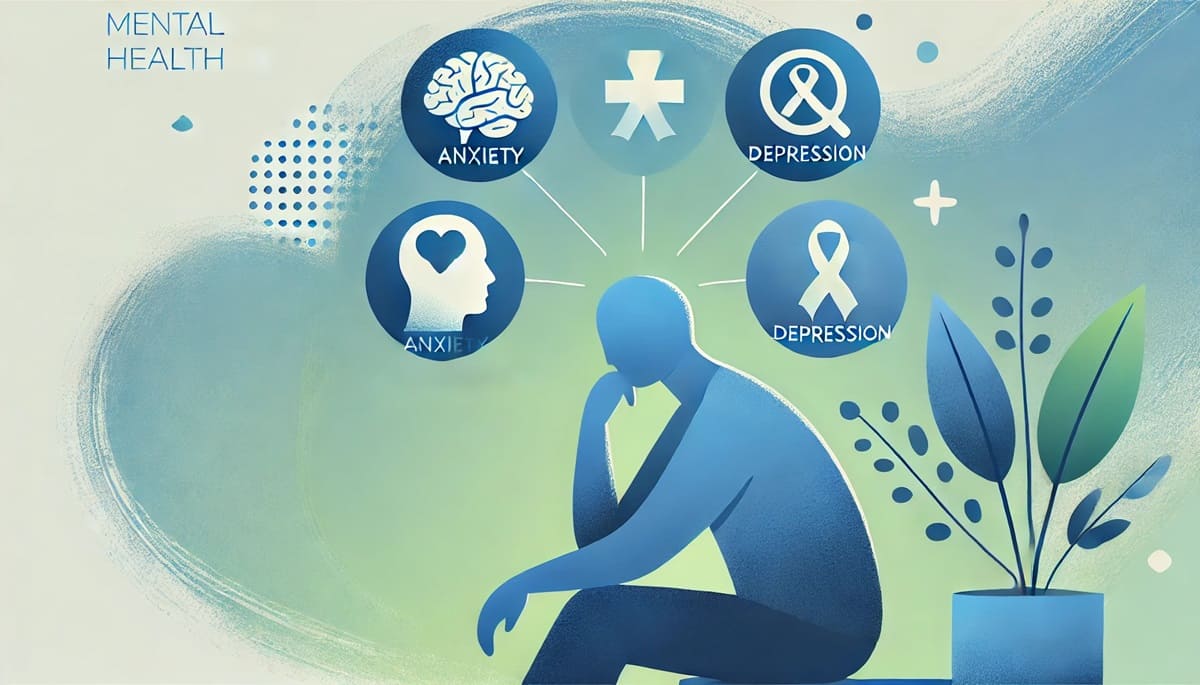
Mental Health: How to Recognize Signs of Anxiety and Depression
Mental health is just as important as physical health, yet it often goes overlooked. Anxiety and depression are two of the most common mental health disorders, affecting millions of people worldwide. Recognizing the signs of these conditions is the first step toward seeking help or supporting a loved one. In this blog, we will explore the symptoms of anxiety and depression, how they differ, and what steps you can take to improve mental well-being.
Table of Contents
ToggleWhat Is Anxiety?
Anxiety is a normal reaction to stress, but when feelings of fear and worry become overwhelming and persistent, it may indicate an anxiety disorder. Anxiety disorders can interfere with daily activities, relationships, and quality of life. Understanding the signs and symptoms of anxiety can help you determine whether it’s time to seek professional support.
Common signs of anxiety:
- Excessive worry: Feeling constantly worried or fearful, even when there is no apparent reason.
- Restlessness: Difficulty relaxing or staying still, often accompanied by a sense of impending doom.
- Irritability: Becoming easily frustrated or angry over small things.
- Physical symptoms: Sweating, trembling, rapid heartbeat, dizziness, and headaches are common physical manifestations of anxiety.
- Difficulty concentrating: Trouble focusing on tasks or experiencing “mind blanks.”
- Sleep problems: Difficulty falling asleep or staying asleep due to racing thoughts.
Bottom line: Anxiety is more than occasional worry—it is persistent and often accompanied by physical symptoms. Recognizing these signs early on can help prevent the condition from worsening.
What Is Depression?
Depression is a mood disorder characterized by prolonged feelings of sadness, hopelessness, and a lack of interest in activities that were once enjoyable. Depression affects not only mood but also physical health, cognitive function, and daily routines. It is important to recognize the signs of depression so that individuals can seek appropriate treatment.
Common signs of depression:
- Persistent sadness: Feeling overwhelmingly sad, empty, or hopeless for most of the day, nearly every day.
- Loss of interest: A lack of enthusiasm or pleasure in activities once enjoyed, such as hobbies, socializing, or exercise.
- Fatigue: Feeling constantly tired, even after sufficient rest, and lacking energy to complete daily tasks.
- Changes in appetite: Significant weight loss or gain, often accompanied by changes in eating habits.
- Sleep disturbances: Experiencing insomnia, waking up early, or sleeping excessively.
- Difficulty concentrating: Trouble making decisions or focusing on tasks due to feelings of mental fog.
- Feelings of worthlessness: Believing that one is a burden, feeling guilty or ashamed without a clear reason.
- Thoughts of death or suicide: In severe cases, individuals may have thoughts of self-harm or suicide.
Bottom line: Depression is more than feeling sad occasionally—it is a serious mental health condition that affects many aspects of life. Early intervention can help individuals manage their symptoms and improve their quality of life.
Differences Between Anxiety and Depression
While anxiety and depression are distinct disorders, they often coexist, and their symptoms can overlap. Understanding the differences can help you or someone you know identify which condition is present and seek the right treatment.
Key differences between anxiety and depression:
- Mood: Anxiety often involves heightened worry and fear, while depression is characterized by feelings of sadness and hopelessness.
- Physical symptoms: Anxiety tends to manifest with physical symptoms like rapid heartbeat and sweating, while depression is more likely to cause fatigue and changes in appetite.
- Emotional triggers: Anxiety is typically linked to specific stressors or fears, whereas depression can occur without an obvious cause.
In some cases, individuals may experience both anxiety and depression simultaneously, making it even more important to seek professional help for proper diagnosis and treatment.
What Causes Anxiety and Depression?
Anxiety and depression are complex conditions with no single cause. They are influenced by a combination of genetic, environmental, and psychological factors. Understanding the potential causes can help individuals identify risk factors and take preventive measures.
Common causes and risk factors:
- Genetics: A family history of anxiety or depression increases the likelihood of developing these conditions.
- Brain chemistry: Imbalances in neurotransmitters, such as serotonin and dopamine, are linked to anxiety and depression.
- Trauma or stress: Experiencing traumatic events, such as abuse, loss, or significant life changes, can trigger anxiety or depression.
- Chronic illness: Living with a long-term health condition can contribute to feelings of hopelessness or fear, leading to anxiety or depression.
- Personality traits: Certain personality types, such as those who are naturally more anxious or perfectionistic, may be more prone to developing mental health disorders.
Bottom line: Anxiety and depression can be caused by a variety of factors, and recognizing these influences can help with prevention and early intervention.
When to Seek Professional Help
Recognizing the signs of anxiety and depression is the first step, but it’s important to seek professional help when these symptoms begin to interfere with daily life. Therapy, medication, and lifestyle changes can all contribute to managing and reducing the impact of anxiety and depression.
Signs it’s time to seek help:
- Symptoms last for more than two weeks and show no signs of improvement.
- Anxiety or depression affects work, school, or relationships.
- You feel unable to cope with daily stressors or responsibilities.
- Thoughts of self-harm or suicide are present.
Treatment options:
- Therapy: Cognitive-behavioral therapy (CBT) is an effective treatment for both anxiety and depression, helping individuals change negative thought patterns and behaviors.
- Medication: Antidepressants and anti-anxiety medications can help regulate mood and reduce symptoms.
- Lifestyle changes: Regular exercise, a balanced diet, and proper sleep can all support mental well-being and reduce symptoms.
Bottom line: Don’t hesitate to seek help if anxiety or depression is affecting your life. Early treatment can significantly improve outcomes.
How to Support Someone with Anxiety or Depression
If you suspect that a friend or loved one is struggling with anxiety or depression, offering support can make a big difference. Knowing how to help without being overbearing is key to providing effective care.
Ways to support someone:
- Listen without judgment: Allow them to express their feelings without offering immediate solutions or judgment.
- Encourage professional help: Suggest they seek therapy or speak to a healthcare professional if their symptoms are severe.
- Be patient: Recovery from anxiety and depression can take time, so offer consistent support without pushing them to “snap out of it.”
- Offer practical help: Simple acts like running errands or cooking a meal can ease their stress and show you care.
Bottom line: Supporting someone with anxiety or depression requires empathy, patience, and encouragement. Let them know they’re not alone and help them seek professional guidance if needed.
Conclusion: Recognizing Anxiety and Depression for Better Mental Health
Anxiety and depression are common but serious mental health disorders that can significantly impact a person’s quality of life. Recognizing the signs of these conditions is the first step toward recovery. Whether you’re experiencing these symptoms yourself or are concerned about a loved one, early intervention can lead to better mental health outcomes. Remember, help is always available—don’t hesitate to seek support and take control of your mental well-being.


